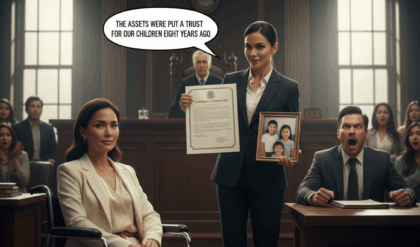My ex made fun of me because I cleaned houses.
I remember perfectly the day Sebastian told me. We were at that corner café we used to go to, and I’d just told him I’d gotten a job cleaning houses.
“Really?” He let out a laugh that still hurts. “Cleaning houses? Oh, Paula, I always knew you wouldn’t get very far.”
I stared at my coffee, feeling my stomach clench.
“It’s honest work, Sebastian.”
“Sure, sure,” he said, leaning back in his chair with that mocking smile. “But I expected more from you. I don’t know, I thought you had ambition.”
That was one of our last conversations. We broke up soon after, and although it hurt, a part of me knew I’d freed myself from something toxic.
***
Today, seven years later, I adjust my blazer in front of the elevator mirror as I go up to the 42nd floor. The tallest corporate building in the city. *My* building.
“Good morning, Mrs. Ramírez,” Miguel, the security guard, greets me.
“Good morning, Miguel. How is your daughter?”
“Very well, thanks for asking. She’s almost graduating, thanks to that scholarship you helped her get.”
I smile and continue toward my office. On the door, the gold letters: *Paula Ramírez – CEO, Diamante Professional Services*.
What Sebastián never understood is that I didn’t *just* clean houses. I observed. I learned. I saw how successful people lived, what routines they had, what they valued. One of my clients, Mrs. Chen, owned a cleaning company. She took me under her wing.
“You have an eye for detail,” he told me one day. And you treat people with respect. That’s rare.
I started out doing her business’s accounting. Then coordinating teams. Then managing corporate clients. When she retired, she sold the company to me. I turned it around: professional training, decent wages, full benefits. Now we have contracts with half the skyscrapers in the city.
My assistant, Karen, comes in with coffee.
“Paula, there’s a man insisting on seeing you. He says he… well, knows you. A guy named Sebastián Mora.”
My breath catches in my throat for a second.
“Sebastian?”
“He says he’s here about the operations supervisor opening. Apparently he didn’t know you were… well, you.”
I can’t help but smile.
“Send him in in ten minutes.”
***
When he comes in, I almost don’t recognize him. His suit is wrinkled, he has dark circles under his eyes. He sees me and pales.
“Paula?”
“Sebastian.” Please sit down.
He slumps in his chair, incredulous.
“You… you’re the CEO.”
“That’s right,” I lay his resume on the desk. “I see you’ve had… several jobs over the past few years.”
“I… didn’t know…”
“That the girl who cleaned houses would go so far?” I finish for him, without malice, just stating a fact.
He shifts uncomfortably.
“Paula, I… about that time, I was an idiot. I was cruel.”
I nod slowly.
“Yes, you were.”
“Is there any chance that…” He points to the resume hopefully.
I look him straight in the eye. For years I’ve imagined this moment, practiced vengeful speeches. But now, sitting here, I feel only indifference.
“Your experience is relevant,” I say finally. “But at this company, we value more than just resumes.” We value respect, humility, and the ability to see the potential in others.
He pauses, waiting.
“I’ll give you a chance, Sebastian. But not as a supervisor. We have a training program. You’ll start from the bottom, learning every aspect of the business. Just like I did.”
His face lights up.
“Really? Paula, you don’t know how much…”
I raise my hand.
“One condition. All of our managers, including myself, rotate monthly. One day a month we work in the field. Cleaning offices, mopping floors, emptying trash cans. So we never forget where we come from and who we serve.”
He swallows.
“Should I… too?”
“Especially you.”
There’s a long silence. Finally, he nods.
“I accept. And Paula… thank you. I don’t deserve your generosity.”
“It’s not about what you deserve,” I stand, indicating the meeting is over. “It’s about who I choose to be. Someone gave me a chance when I needed it most. I’m just returning the favor.”
As she leaves, Karen pokes her head in.
“That was very classy of you.”
I shrug.
“Years ago, I would have wanted to rub it in her face. But I no longer need validation from people who couldn’t see my worth.”
I look out the window at the city. Somewhere down below, someone is cleaning a house, dreaming of something bigger. I hope she knows there’s no shame in honest work. Only stepping stones to where you want to go.
My phone rings. It’s Mrs. Chen.
“Paula? I saw you hired more staff. I love what you’re doing, honey.”
“I learned from the best,” I reply, smiling.
And it’s true. Everything I am began with a mop in my hand and the will to not let anyone define my future.
Not even Sebastian.
The next morning, the elevator doors opened on the 10th floor — the floor where all new hires began. The “field floor,” as we called it.
There, among the hum of vacuums and the smell of disinfectant, stood Sebastián.
He was wearing one of the company’s gray uniforms, holding a mop awkwardly. His expression was a mix of shame, humility, and something else… maybe gratitude.
When our eyes met, I simply nodded. “Welcome to training week, Mr. Mora. I trust Karen showed you where the supplies are?”
“Yes, ma’am,” he replied quietly. His voice no longer had that cocky confidence I once knew — only the subdued tone of someone who’d finally learned to listen.
“Good,” I said. “Then get to work. The 10th floor is all yours today.”
I turned to leave, but as I walked away, I could feel his eyes following me — not with bitterness this time, but with respect.
The Humbling Process
A few days later, Karen came into my office holding a clipboard and trying not to laugh.
“You might want to see this, Paula,” she said. “Sebastián’s floor report.”
I took it, scanning quickly. His handwriting was neat, but the comments made me smile.
‘Note to management: Mopping looks easier than it is. My respect to whoever invented non-slip shoes.’
‘Mr. Jiménez, the senior cleaner, taught me the right way to wring a mop. He said, “Pride doesn’t remove stains, elbow grease does.” I think I’ll remember that.’
For the first time, I felt something soften in me. Not forgiveness, exactly, but acknowledgment that people really could change — if life humbled them enough.
The Elevator Meeting
Two weeks later, I found myself in the same elevator with Sebastián. He was carrying cleaning supplies, and I was on my way to a board meeting.
The silence between us was thick but not uncomfortable.
“You know,” he said suddenly, “I used to think success meant sitting in an office, wearing a suit.”
“And now?” I asked.
He looked down at the mop handle in his hands. “Now I think success is doing something with purpose. No matter what it looks like.”
I smiled faintly. “Took you long enough to figure that out.”
He laughed softly. “Yeah… it did.” Then, after a pause, he added, “Paula, I wasn’t just cruel back then. I was scared. Scared of being ordinary. So I made others feel small to feel big.”
“That’s not an excuse,” I said, though my voice was gentler than I intended.
“I know,” he nodded. “That’s why I’m not asking you to forgive me. I just wanted to say it out loud.”
When the elevator stopped, I stepped out and turned back to him. “If you keep showing up like this — honest, humble, willing to learn — you’ll go further than you think.”
Three Months Later
It was Friday morning when I walked into the operations meeting and saw Sebastián sitting quietly among the staff, taking notes. He’d finished his rotation program and was being considered for a permanent position — not because of his past, but because of his progress.
Miguel, our head of field training, spoke first.
“He’s been punctual every day, ma’am. Never complained once. He helps the new recruits and volunteers for extra shifts. The team respects him.”
I looked at Sebastián. “Do you have anything to say for yourself?”
He cleared his throat. “Only that I finally understand what you meant — about this company valuing respect more than resumes.”
The room fell silent. I smiled. “Then I think you’ve earned a promotion. Floor Supervisor, starting next week.”
The applause from the team was genuine. Sebastián looked stunned.
After the meeting, he approached me privately.
“Why are you giving me another chance, Paula? After everything I said back then?”
I met his gaze. “Because if Mrs. Chen hadn’t given me one, I’d still be scrubbing floors with no future. Growth only happens when someone believes you can be better.”
His eyes glistened. “I won’t waste it.”
“I know,” I said. “Now go — your team’s waiting.”
Full Circle
Months passed. Sebastián proved himself — disciplined, fair, kind. He even started mentoring younger workers, teaching them not just how to clean, but how to dream.
One afternoon, I caught him talking to a new hire — a shy young man who seemed embarrassed to be there.
“Don’t ever let anyone tell you cleaning isn’t important,” Sebastián said. “I used to think like that. But trust me, no one builds anything great if they look down on honest work.”
I smiled from afar. Maybe, I thought, redemption sometimes wears a gray uniform and carries a mop.
Epilogue
A year later, at our company’s anniversary gala, I stood on stage giving my speech. As I looked out at the crowd — hundreds of employees in elegant attire — I spotted Sebastián at one of the tables, clapping, smiling genuinely.
When the applause died down, I said:
“People often ask me what Diamante means. For me, it’s simple. A diamond isn’t born perfect. It’s coal that handled pressure exceptionally well. And every one of us here… we are that diamond.”
The room erupted in applause.
Afterward, Sebastián came up to me. “You know, Paula, you really did get far.”
I looked at him, not with pride, but with peace. “No, Sebastián. We did.”
Because sometimes, the greatest success story isn’t the one where you rise above someone —
but the one where you rise together,
on the very floor where someone once laughed at you.
News
Marrying a rich disabled husband to pay off debt to “save” her father, she was looked down upon by her husband’s family for 7 years. One day, he stood up and walked. His first words left the whole family speechless./hi
Marrying a rich disabled husband to pay off her father’s debt, she was despised by her husband’s family for 7 years, until one day he stood up and walked, his first words left the whole family speechless Seven years ago,…
Every week my mother-in-law comes to my house 3 to 4 times, every time she cleans out the refrigerator, gathering all the food for her sister-in-law. Too dissatisfied, I quietly put something in the refrigerator that makes her tremble with fear./hi
Every week, my mother-in-law would come to my house three or four times, and every time she would clean out the refrigerator and take all the food for her sister-in-law. I was so dissatisfied that I quietly put something in…
A Punch. A Pause. And Then? They Realized the New Girl Wasn’t Who They Thought./hi
Bullies Punched a New Black Girl in The Face — Big Mistake… They Had No Clue Who She Really Was The Morning It All Began It was supposed to be just another Tuesday at Westbridge High, a suburban school known for…
One unplanned visit to his maid’s house — one door opened — and a truth powerful enough to shatter his beliefs forever./hi
Without warning, the millionaire decided to visit his maid’s house. He never imagined that by opening that door he would discover a secret capable of changing his life forever. One Thursday morning, with the golden sunlight filtering through the leaves…
My husband said he was on a business trip for 3 days, but the location showed he was at the maternity hospital. I didn’t make a fuss — just quietly did 3 things, causing his life to fall into the abyss of humiliation./hi
My husband said he was going on a business trip for 3 days, but the location showed he was at the maternity hospital. I didn’t make a fuss — just quietly did 3 things, causing his life to fall into…
To legitimize the pregnancy, I agreed to marry a worker. But when my daughter turned three, I was stunned to find something in my husband’s wallet – and then, I understood why he had agreed to marry me all those years ago./hi
To legitimize the pregnancy, I agreed to marry a factory worker. But when my daughter turned three, I was stunned to find something in my husband’s wallet – and then, I understood why he had agreed to marry me. My…
End of content
No more pages to load











